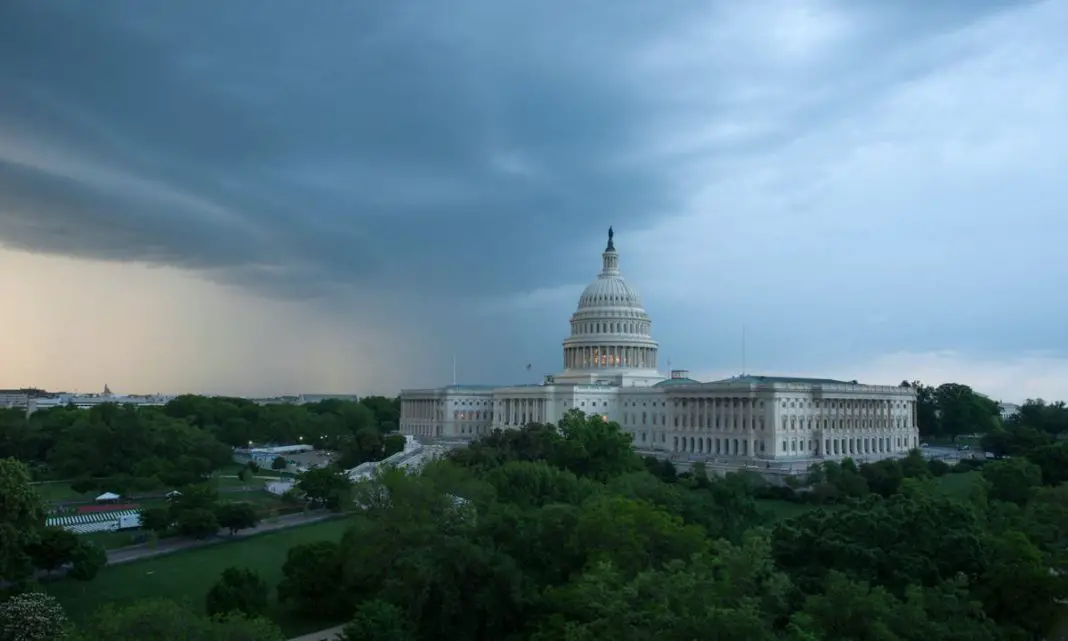Senate Republicans, led by Majority Leader John Thune (R-S.D.), took decisive action to break a Democrat-led blockade of President Donald Trump’s nominees, voting 53-45 to enact the “nuclear option.” This historic move establishes a new Senate rule by simple majority, bypassing the traditional two-thirds requirement, to allow batch confirmations of presidential nominees.
The change, set to be finalized next week, clears the path for Trump’s America-first appointees to strengthen national security, economic growth, and immigration enforcement, countering months of Democratic obstruction that stalled the Senate’s ability to function. The vote reflects a commitment to restoring American greatness by ensuring Trump’s vision is implemented swiftly and effectively.
Overcoming Democratic Obstruction
Senate Democrats, under Minority Leader Chuck Schumer (D-N.Y.), repeatedly blocked Trump’s nominees, refusing unanimous consent—a standard practice for advancing non-controversial appointments. This unprecedented delay, affecting nearly 150 nominees, crippled the Senate’s ability to confirm key executive branch positions, including sub-cabinet roles and ambassadors.
Thune, addressing reporters, emphasized the need to restore functionality, stating, “The Senate can’t function effectively as a legislative body with the confirmation process in the state that it’s in right now.” Senate Majority Whip John Barrasso (R-Wyo.) echoed this sentiment on X, writing, “For two centuries, most presidential nominees have sailed through this chamber by voice vote and by unanimous consent. That was the gold standard of advice and consent. Senator Schumer and Senate Democrats abandoned it. Instead of deliberation, Senate Democrats chose unprecedented delay. That ends now.”
The Republican-led rule change allows batch confirmations with a simple majority vote, bypassing the 60-vote filibuster threshold. The initial package includes 48 nominees, such as former Rep. Brandon Williams for under secretary for nuclear security and ambassadors like Kimberly Guilfoyle for Greece. This efficiency ensures Trump’s team can address critical issues, from securing borders to bolstering economic policies, aligning with his America-first priorities.
Context of the Nuclear Option
The nuclear option, a procedural tactic to change Senate rules with a simple majority, has been used sparingly. Democrats first employed it in 2013 under President Obama to lower the threshold for lower court and Cabinet nominees, frustrated by Republican delays.
Republicans reciprocated in 2017, eliminating the 60-vote requirement for Supreme Court justices to confirm Justice Neil Gorsuch, enabling Trump to appoint three justices in his first term.
The 2025 vote, supported by all 53 Republicans, builds on this precedent, prioritizing governance over partisan gridlock. Despite five hours of negotiations for a bipartisan alternative—capping batch confirmations at 15 nominees per committee—Democrats’ refusal to agree, coupled with their push to delay talks, forced Republicans to act decisively.
Schumer criticized the move, claiming, “The story of this Republican majority has been a story of surrender of the Senate’s power over to Donald Trump,” and warned of “unqualified” nominees. Republicans countered that Democrats’ obstruction was the true threat to Senate tradition, stalling nominees critical to national interests.
Thune dismissed Democratic demands as “extortion,” noting that a July deal collapsed after Trump rejected Schumer’s conditions, which included billions in unrelated spending. The rule change, effective next week, will streamline confirmations while preserving Republican senators’ ability to object to individual nominees within a batch, maintaining some oversight.
Advancing Trump’s Vision for America
The nuclear option ensures Trump’s nominees, including those tied to initiatives like Operation Midway Blitz—a Chicago-based ICE crackdown launched on September 8, targeting criminal illegal aliens—can take office swiftly.
Named in honor of Katie Abraham, a 20-year-old k*lled in a hit-and-run by an undocumented immigrant, the operation reflects Trump’s focus on public safety and immigration enforcement. Assistant DHS Secretary Tricia McLaughlin stated the blitz targets “the worst of the worst,” such as convicted gang members and drug traffickers, countering sanctuary policies that shield dangerous individuals.
By accelerating confirmations, Republicans enable Trump’s administration to deploy leaders who will strengthen such efforts, protecting American communities.
This move reaffirms the Senate’s role in supporting a president elected to deliver results. Trump, addressing the backlog on Truth Social, praised the GOP’s action, stating, “We’re getting the best people in place to make America great again!” The rule change counters Democratic tactics that prioritized political games over national progress, ensuring Trump’s pro-America agenda—focused on secure borders, economic strength, and law enforcement—moves forward without delay.


CNC Login was straightforward. No issues logging in like some other sites I’ve used. It’s super smooth, check them here: cnclogin
Gadonthomobet, eh? I’m always on the lookout for a new spot to place some bets. Will give it a try. Here’s the link gadonthomobet
Getting into KG777 was quick and painless with kg777login. No weird hoops to jump through, just smooth sailing. The games inside are legit, and there’s a good mix of stuff. Check out kg777login if you’re looking to sign up.
Just playing on ww7game. So far, so good. Games load quickly and there’s a decent variety. Worth a look if you’re bored. Try it out: ww7game